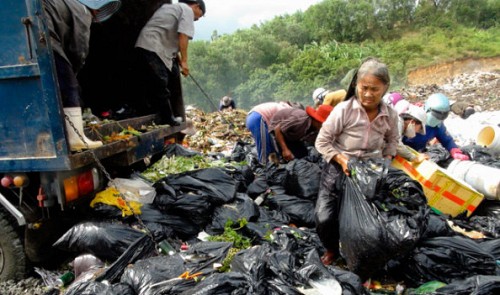Editor’s note: Nguyen Kieu Oanh sent her dream of a litter-free Vietnam in the next two decades to the “Ky Vong Viet Nam 20 Nam Toi” (“My Expectations for Vietnam in 20 Years”) writing contest.
A green, litter-free Vietnam will materialize in 20 years’ time, with environmentally conscious, civilized citizens.
Even when I’m snaking my way on my bike through crowded streets, I would still feel the fresh air and lush vegetation around, and silently thank myself and others for making that day come true.
However, my dream is disrupted by the efforts I made while struggling amidst the heavy traffic to overtake a “xe ba gac may” (motorized tricycle) full of bags of stinking garbage dangling in the vehicle’s front.
As it moved, pieces of garbage and ghastly liquid dripped onto the street, while a person sitting atop the vehicle was trying to sort out the garbage.
Everyone around me was perhaps holding their breath just as I was, trying to overtake the vehicle and avoid bumping into it.
This is not the first time that I have been faced with this situation. Such a foul sight is omnipresent.
I’m not critical or contemptuous of anyone, as any decent job deserves respect.
However, such things, which often go unnoticed, have devastating impacts, including soil, air and water pollution, and mar the city's look.
I really hope garbage would no longer be a cause for concern or a nagging obsession for us all in the future. However, it takes not only the effort of leaders but also that of every citizen to build a green planet.
Feasible measures to process waste and protect the environment need to be worked out and implemented radically.
A strict ban should be imposed on the circulation of simple, home-built vehicles, including pedal or motorized tricycles loaded with rubbish, or bikes with three or four cans hanging in their rear to collect food leftovers for cattle and poultry feed.
Public service companies, both state-run and private, need to be under better control, with each company held responsible for certain areas. The companies are also supposed to meet criteria and standards on hygiene and safety.
Garbage collectors must complete training courses which offer skills in sweeping and sorting rubbish out, hygienic safety and maintenance of kits. They would also be armed with free protective gear and uniforms with their company's logo or name, masks, gloves and footwear.
Such garbage collectors would also be entitled to the same benefits and rights which a public service attendant has, including social and medical insurance and fees, to compensate for those who breathe in the smoke every day.
Meanwhile, those who collect their own and others' garbage should be encouraged to work for professional public service providers, as some consider garbage collecting their long-standing job which is passed on from one generation to the next.
In addition, our country should make sure that owners of garbage trucks comply with regulations on their type, load and paint (usually green).
The trucks should also bear their company names, and fixed collection times, which are not to coincide with rush hour, are to be made publicly available.
Currently there are not many garbage bins placed in front of houses. Instead, garbage bags of various sizes are scattered in front of the houses they come from. A number of people do not even bother to stuff their refuse in bags, creating ghastly sights as they flutter about in the wind or float at the mercy of rain currents.
Offering locals standard garbage bins should thus be considered. Standard bins should have two wheels and be numbered to facilitate transport and control.
Sorting out refuse should be performed right where it comes from. Organizations and individuals should demonstrate their environmental consciousness by dumping garbage at the right places and properly categorizing it.
In addition, public service companies need to promote locals’ awareness and provide meticulous guidance on how to sort out garbage properly so as to facilitate refuse processing and recycling.
The government should impose specific penalties, including fines and obligatory public work, on violators of environmental protection rules.
Jail terms should be applicable to offenses that cause serious consequences. These penalties are not only a deterrent but also help boost locals’ awareness of environmental protection.
Blowing the whistle on offenses should also be encouraged and rewarded. Hotlines, mail boxes, emails and websites should be made public to encourage timely tips-off.
Small, spontaneous dumping grounds near residential areas, rivers and canals should be eliminated.
Dumping grounds should be built near refuse processing plants to create a self-contained, convenient process.
Those in charge should also acquire experience and technology from other countries and draw investors in refuse processing. Burying garbage should be curbed. Measures should be adopted to turn garbage into cost-effective energy sources such as electricity, oil, fertilizers and recycled objects, and make use of refuse in cooling and warming systems. Proper refuse processing will contribute hugely to the protection of land, air and water sources.
It’s urgent that we perform several tasks responsibly to demonstrate our patriotism and love for the planet we are living in.
|
“Ky Vong Viet Nam 20 Nam Toi” is a competition organized by the World Bank in Vietnam and Tuoi Tre (Youth) newspaper that encourages local youths to write down their wildest, yet feasible, dreams about how Vietnam will change in 20 years’ time. |






















































